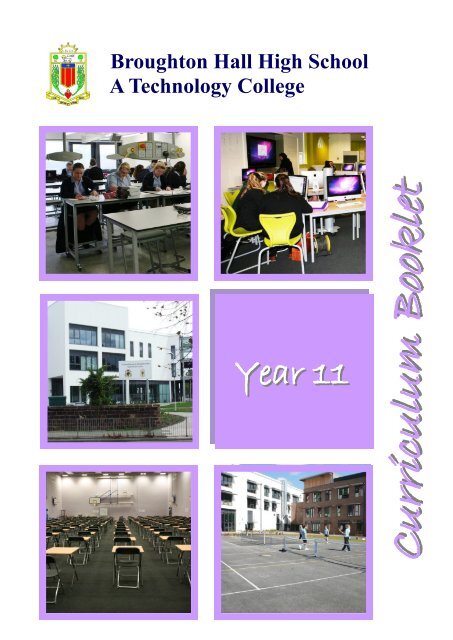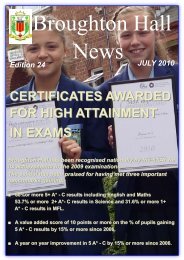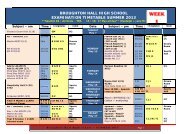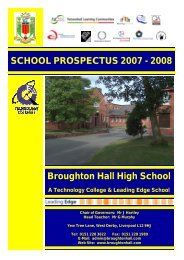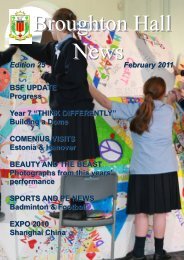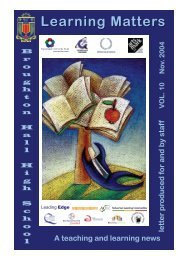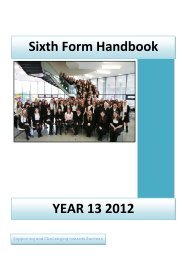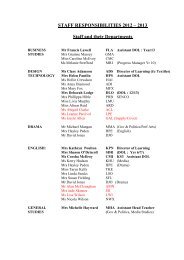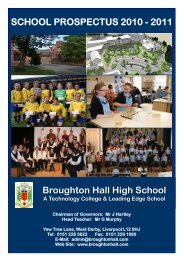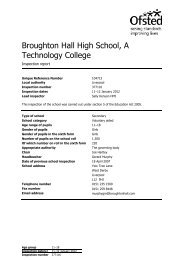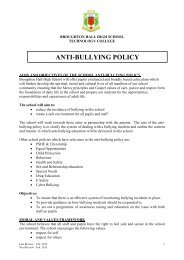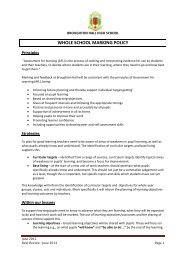YEAR 11 - Broughton Hall High School
YEAR 11 - Broughton Hall High School
YEAR 11 - Broughton Hall High School
Create successful ePaper yourself
Turn your PDF publications into a flip-book with our unique Google optimized e-Paper software.
<strong>Broughton</strong> <strong>Hall</strong> <strong>High</strong> <strong>School</strong>A Technology CollegeYear <strong>11</strong>Curriculum BookletCurriculum Booklet
GCSE ExaminationsFor all year <strong>11</strong> students, this school year (2012/2013) is very important.In May 2013 you will start your final GCSE examinations. The results that you gain in thesemay have a big effect on your future.Nearly all your GCSE’s are assessed partly by practical examinations and controlled tests andpartly by written examination. It is important that the same commitment is given to all aspectsof your GCSE to achieve the best grades possible.Controlled AssessmentsControlled Assessments have replaced the Coursework elements of Examinations. They aredone using the same concept of Coursework but within a Controlled environment. These willbe planned sessions organised within the school day, when work will be done and saved inschool, this work with be assessed by the teacher and moderated by the Examination boards.Follow the link on <strong>Broughton</strong>hall.com/examinations/controlled assessmentsRevisionRemember that the examinations in most subjects will test you on any topics that you havecovered in the previous two years. It is essential that you revise all work thoroughly. Youshould organise your revision beforehand and make a start well before the examinationsbegin. Some time spent on revision at this stage could be well rewarded in your future.Your teachers will be able to help you with specific advice about revision in particularsubjects.<strong>Broughton</strong> <strong>Hall</strong> <strong>High</strong> <strong>School</strong> web site ~ www.broughtonhall.comThe school website holds lots of information for students and parents.Students can access their MOODLE account through the website, Departments add subjectspecific revision work and past papers to their areas of MOODLE and it is revised regularlythroughout the year.The Examination area of the website holds lots of vital information, including timetables andlinks to many revision sites including Podcasts to download.GCSE Examinations 2013Coursework: Examinations WeightingArt and DesignGCSE OCRArt & DesignTextile Optional UnitBTEC Level 2 extendedcertificate EDEXCELAsdanCoPEBusiness StudiesGCSEBusinessOCR L2 National AwardCateringGCSE WJECDanceGCSE AQA60% Portfolio40% Exam100% Coursework100% Portfolio25% Internally75% Externally100% CourseworkCoursework 60%Examination 40% (2 tiers higher and foundation)Unit 1 Written Paper (15%)Unit 2 Set Dance (20%)Unit 3 Group Performance (20%)Unit 4a Solo Composition (20%)Unit 4b Solo or Group Choreography (25%)2
DramaGCSE EDEXCELEnglish LanguageGCSE AQAEnglish LiteratureGCSE AQAFood TechnologyGCSE AQAGeographyGCSE EdexcelGraphic ProductsGCSE AQAHealth and SocialOCRLevel 2 National AwardHistoryGCSE AQAICTMFLSpanishGCSE EdexcelFrenchGCSE EdexcelSpanish/FrenchNVQ OCRMaths ModularGCSE EdexcelMusicGCSE EdexcelBTEC SportEdexcelREEdexcelResistant MaterialsGCSE AQAAdditional ScienceAQABTEC in APPLIED SCIENCEEdexcelPrinciples of Applied ScienceTextilesGCSE AQA1.Exploring Drama in a practical way with a controlled Assessment andwritten commentary. (30%)2.Exploring Play Texts focusing on characters, interpretations of plays anddesign implications-with a Controlled Assessment and written commentary.(30%)3.Drama Performance –devised or scripted/play performance to anaudience including a visiting examiner. (40%)40% Written exam /40% Controlled assessments20% speaking & listeningWritten exam 35%Modern texts exam 40%Controlled assessments 25%60% Controlled assessments40% Controlled assessments25% Controlled assessments75% Exam60% Controlled assessments40% Controlled assessmentsAssessment is by 3 portfolios—Final x 2Assessments in Year <strong>11</strong> (100% Portfolio)25% Controlled assessment75% Exam100% Coursework60% Controlled assessment 40% Exam60% Controlled assessment 40% Exam100% ExamsExamination 40% ListeningCoursework 30% PerformanceCoursework 30% Composition100% Coursework100% Exam60% Coursework40% ExaminationControlled assessment 20% Exam 80%100% Portfolio3 internally assessed units 25% each exam 25%60% Coursework40% Examination3
MISSION STATEMENTFounded by the Sisters of Mercy, <strong>Broughton</strong> <strong>Hall</strong> is committed to the CatholicEducation of girls through Gospel values which permeate the life of the school.AIMSTo recognise, nurture and celebrate the unique gifts, dignity and potential of eachindividualTo develop a caring, joyful and friendly community in which all work hard and are happyTo achieve excellence through an education which:is concerned with the whole person; enables each person to develop spiritually,aesthetically, vocationally, physically, academicallyTo foster a strong sense of community by:generosity of spirit;sensitivity and tolerance;forgiveness and compassionOBJECTIVESTo ensure that all school policies and documents are rooted in these aimsTo ensure that each pupil leaves with a positive self-imageTo provide a curriculum and teaching strategies which acknowledge and respond tothe needs of allTo create a welcoming, safe, attractive environmentTo promote an awareness of equal opportunities, social justice, peace and globalissuesTo strengthen the partnership of staff and pupils with parents, governors, parishes andlocal community, united in a common purpose.4
ContentsGCSE Examinations Page 2Coursework/Examination Weighting Page 3Mission Statement Page 4Contents Page 5Pastoral Care Page 6Head teacher / Deputy Heads / Assistant Head Teacher Page 7Progress Manager/ Progress Tutor Details Page 8The <strong>School</strong> Day / Term Dates Page 9Calendar of Events Page 10Year Guide / <strong>School</strong> Uniform Page <strong>11</strong>Attendance and Punctuality Page 12Ten Strategies for Effective Learning Page 13Assertive Mentoring Page 14All Subjects(breakdown of each curriculum by department)Page 15- Page 38Personal Possessions / Mobile Phones / Water Page 39<strong>School</strong> Website Page 39Exam Preparation Page 40Students in Key Stage 4 are entering a very important stage as theywill be preparing for and taking public Examination, the results ofwhich could influence their future career path. It is hoped that eachstudent will show commitment in order to reach her potential andachieve success.Parents can provide the support and encouragement needed to helptheir daughter make full use of the resources and opportunitiesprovided by <strong>Broughton</strong> <strong>Hall</strong> so that she is equipped to meet thechallenges of the modern world.5
Pastoral CareThe Head teacher is assisted in the organisation and running of the school by the Leadership Team,Subject Leaders and Progress Managers. The Progress Manager, with the help of Progress Tutors andthe Student Support Manager has overall responsibility for the pastoral care of all pupils in their yeargroup. The Progress Manger will have regular and direct contact with parents, especially whenproblems arise. Parents have the opportunity to arrange an interview with their daughter‘s ProgressManager, Student Support Manager, Director of years <strong>11</strong>, 12 & 13 or the Head teacher if the nature ofa problem is very serious.Please ensure that the school is kept informed of any illness, medical or family problem which mayaffect you in school. Any such information will be treated in confidence.Information is sent home to parents by means of termly newsletters and Head teacher's letter.An opportunity to share in the activities of the school is provided through the Parent‘s Associationwhich has as one of its main aims, the fostering of links between school, home and parish. The PTA isan invaluable support to the work of the school, and is involved in the organising of social andfundraising activities throughout the year.STAFF WHOM PARENTS MAY WISH TO CONTACT:-TELEPHONE: 0151 235 1500FAX: 0151 259 8448EMAIL: admin@broughtonhall.comPROGRESS MANAGER<strong>YEAR</strong> SUPPORT MANAGERDIRECTOR OF <strong>YEAR</strong>S 10 & <strong>11</strong>MS E PENNYMrs S TAYLORMs CONNOLLYASSISTANT HEADTEACHERMrs M HAYWARDDEPUTY HEAD TEACHERSMs S CLARKEMrs M GRANTMr G PRESTONHEADTEACHERMr G M MURPHY6
Head Teacher Mr Murphys you prepare for your GCSEs we continue to settle into ourA superb new facilities as we try to provide the very best opportunitiesfor you. These are now crucial times in your education asthe qualifications you achieve will form the foundation for your futurecareers. Remember to be honest with yourself and work hardto be the best that you can be.Good LuckDeputy Head TeachersMs Clarke Mrs Grant Mr PrestonAssistant Head TeacherDirector of Year 10 & <strong>11</strong>Mrs HaywardMs Connolly7
<strong>YEAR</strong> <strong>11</strong>Progress ManagerMs E PennyYear Support ManagerMrs S TaylorAppointment procedure for meeting YSM/Concerns/IssuesContact the Year Support Manager to discuss issues and if necessary make an appointment.<strong>11</strong> NightingaleProgress tutorMs K Jewellemail<strong>11</strong>nightingale@broughtonhall.com<strong>11</strong> McAuleyProgress tutorMs G Parryemail<strong>11</strong>mcauley@broughtonhall.com<strong>11</strong> PankhurstProgress tutorMrs L FieldingEmail<strong>11</strong>pankhurst@broughtonhall.com<strong>11</strong> ParksProgress tutorMs M Cannyemail<strong>11</strong>parks@broughtonhall.com<strong>11</strong> FrankProgress tutorMs K Stoneemail<strong>11</strong>frank@broughtonhall.com<strong>11</strong> KellerProgress tutorMs A Croftemail<strong>11</strong>keller@broughtonhall.com<strong>11</strong> CurieProgress tutorMr B Jamesemail<strong>11</strong>curie@broughtonhall.com<strong>11</strong> AustenProgress tutorMrs H Crewdsonemail<strong>11</strong>austen@broughtonhall.com<strong>11</strong> ClitherowProgress tutorMrs A Howardemail<strong>11</strong>clitherow@broughtonhall.com8
The <strong>School</strong> Day September 20<strong>11</strong>SCHOOL STARTSREGISTRATIONPERIOD 1PERIOD 2BREAKPERIOD 3PERIOD 4LUNCHPERIOD 5REGISTRATION8.40am8.45am8.55am ~ 9.55am9.55am ~ 10.50am10.50am<strong>11</strong>.10am ~ 12.10pm12.10pm ~ 1.10pm1.10 ~ 2.00pm2.00pm ~ 3.00pm3.00pm ~ 3.10pmTerm DatesAutumn TermMonday 3rd September 2012Monday 22nd– Friday 26th OctoberThursday 20th December 2012Term StartsHalf Term HolidayLast day of TermSpring TermMonday 7th January 2013Term StartsMonday 18th – Friday 22nd February Half Term HolidayThursday 28th March 2013 Last day of term for PupilsMon 1st—Fri 12th AprilSpring HolidaysSummer TermMonday 15th April 2013Monday 6th May 2013Monday 27th – Friday 31st MayThursday 23rd July 2013Term StartsBank HolidayHalf Term HolidayEnd of term.Proposed Training DaysMonday 3rd September 2012Thursday 18th October 2012Friday 19th October 2012Monday 15th April 2013Wednesday 24th July 20139
Year <strong>11</strong> Calendar of Events all dates are provisional and may be subject to changeMonday 3rd September Inset DayThurs 4th OctThurs <strong>11</strong>th OctYear <strong>11</strong> BTEC Art & Design-The Gallery of Costume, Platt <strong>Hall</strong> ManchesterYear <strong>11</strong> Assertive Mentor InterviewsThursday 18th October & Friday 19th October Inset DaysMonday 22nd October to Friday 26th October Half Term HolidayThurs 22nd NovMon 10th DecTues 18th DecWed 19th DecThurs 20th DecYear <strong>11</strong> Assertive Mentor InterviewsYear <strong>11</strong> English GCSE Workshop—all DayYear <strong>11</strong> Reward DayYear <strong>11</strong> Mock Results DayYear <strong>11</strong> Coursework Catch UpYear <strong>11</strong> Coursework Catch UpFriday 21st December-Friday 4th January Christmas HolidaysMon 7th JanThurs 31 JanYear <strong>11</strong> Assertive Mentor InterviewsMeet mentees re Mock ResultsYear <strong>11</strong> Sixth Form Information Evening7pm Sixth Form CentreMonday 18th February-Friday 22nd February Half Term HolidayThurs 7th MarchYear <strong>11</strong> Festival of Skills—Trafford CentreThursday 28th March -Friday 12th April Easter HolidayMonday 15th April Inset DayThurs 2nd MayYear <strong>11</strong> Drama GCSE External ModerationMonday 6th May—Bank HolidayThurs 9th MayYear <strong>11</strong> Assertive Mentor InterviewsMonday 27th May-Friday 31st May HolidayFri 28th JuneYear <strong>11</strong> Leavers Celebration –Sixth Form CentreWednesday 24th July 2012 Inset DayHomeworkYear <strong>11</strong> homework may experience different levels of homework workload throughout the year due toexam preparation or controlled assessment deadlines. All pupils should be completing revision as partof on going work throughout the year.BBandHBandMONDAY TUESDAY WEDNESDAY THURSDAY FRIDAYEnglish Option 3 Option 2 English MathsScience Asdan/MFL RE Maths ScienceOption 1MONDAY TUESDAY WEDNESDAY THURSDAY FRIDAYOption 2 Science R.E English MathsMaths English Spanish/Tech Asdan/MFL ScienceScience10
Year <strong>11</strong> GuideYear <strong>11</strong> Pupils will continue to study for a range of external qualifications known as GCSEsvocational and academic courses are provided for, as in Entry Level Certification. Year <strong>11</strong> is alsothe time to start thinking about the future. The school provides career guidance.Although the system is constantly changing, your involvement during this crucial year can make anenormous difference—the difference between success and failure or between poor grades andA to C passesDEMANDS ON YOUR DAUGHTER ARE LIKELY TO INCLUDE:Being more self motivated and taking more responsibility for her own learningAsking when she doesn‘t understandOvercoming difficulties with challenging work and finding ways of coping under pressureOrganising herself, notes, information and hand-outs on many different subjectsCompleting more work at home, independently.Organising and planning her time over longer periods e.g. Coursework.Understanding exam structure and the importance each piece of work has towards the final grade.Planning and completing revisionPerfecting examination techniqueBalancing time spent in study with outside interests which may need to be sacrificed for long termsuccessPARENTS CAN SUPPORT THEIR DAUGHTERS BY:Attending review meetings and Parents‘ EveningsWorking with staff to ensure your daughter is completing her work and meeting deadlinesFinding out about course structure and requirements e.g. coursework, exams being taken by yourdaughter.Discussing work with your daughter, helping with any problems.Providing a comfortable work area at homeSetting Guidelines for homework to be done each evening.Ensure your daughter gets enough rest, sleep, exercise, good diet etc.In Key Stage 4, pupils have the option of wearing a <strong>Broughton</strong> <strong>Hall</strong>uniform Cardigan (Navy with a paler blue strip) instead of a jumperBlazers are still compulsory for Key Stage 4DanceNavy blue/black plain fitted topDance pants/jogging bottomsYear <strong>11</strong> PE Kit.Pale Blue Polo shirt with <strong>Broughton</strong> <strong>Hall</strong> badgeNavy Shorts with white pipingNavy Tracksuit Bottoms with white pipingNavy Sweat top with <strong>Broughton</strong> BadgePale blue socks.White laced trainers.Kit can be bought from Kids Kirby Ltd, 29 St Chads Parade Centre, Kirkby,Liverpool, L32 8UG. Telephone number 0151 5489390You can download a kit order form from the <strong>School</strong> Website,www.broughtonhall.comUniform
ATTENDANCERegular attendance at school is vital ~ 95% being the minimum required attendance ~ even thismeans nearly 2 weeks or 50 lessons have been missed. Pupils learn best and receive most fromschool when they are actually there! This issue is highlighted regularly in letters home and is featuredin the Home <strong>School</strong> Agreement.Parents are asked to avoid taking pupils on holidays during term time; all holidays are counted as anunauthorised absence. The school also requests that as far as possible medical and dentalappointments are made out of school hours.Registers are marked daily both morning and afternoon in accordance with the instructions given bythe Department for Education. Notes are retained and any absences without a parental note arerecorded as unauthorised by the school.On the first day of a pupil‘s absence parents are asked to telephone school by 10am. If no contact hasbeen made, enquires will be made by school staff, by text message in the first instance.This could be followed up by letter or in exceptional circumstances through the Educational WelfareOfficer.Parents are asked to provide a written explanation for each and every absence upon a pupil‘s return toschool, even if a telephone call has been made.In any case of suspected truancy parents will be informed of the school‘s concern at the earliestpossible opportunity.Should your daughter‘s contact details, emergency names, telephone numbers, or parental salutation(i.e. Mrs Hill or Mr and Mrs Jones) change during the year please inform your Head of Year or theschool office. As the school number is ‗withheld‘ please leave a mobile number where you may becontacted in case of sickness or an emergency.APPOINTMENTS DURING THE SCHOOL DAYPlease note that students are not allowed to leave the premises at any time during the school daywithout the permission of their Progress Manager or a Senior Member of Staff. Appointments shouldideally be arranged outside of school hours or during holidays. If an appointment is unavoidable theschool should be informed in writing and the note countersigned by the Progress Manager. Yourdaughter will then be issued with an absence pass authorising her absence from school and must becollected in person from the school office. In accordance with HSE guidelines no girl will be allowed tomeet parents outside school.PUNCTUALITYIf a pupil is late this means not only does she miss registration or assembly, when important informationis given out, but she will not be able to get to her locker for the books and equipment sheneeds for lessons 1&2. Being late for school means being late or not equipped for lessons and causesdisruption to other pupils. Please encourage your daughter to be in school by 8.30 in order to organiseherself. It is a good idea to check bus routes, stops and fares during the summer holidays, so that yourdaughter feels happy and secure about travelling to school. If your child is eligible for a bus passplease apply to the LEA as early as possible.PROGRESS MANAGER’S DETENTIONIf your daughter is late without a very good cause or late twice in one weekshe will be required to do late detention with her Progress Manager.This is held weekly on a Wednesday evening and lasts for 1 hour.Parents are notified 24 hours in advance of their daughters‘ detention.Please note this detention is not negotiable.12Attendance & Punctuality
Attendance & PunctualitySICKNESS AND EMERGENCIESIn case of illness or an accident, it may be necessary to send your daughter home or to hospital. Wecan not do this if we are unable to contact you. Therefore it is vital that you inform us of any changeto your EMERGENCY TELEPHONE NUMBERS ~ including mobile numbers. Please be assured that wewill only use this number in an emergency.PLEASE NOTE THAT WE ARE NOT ALLOWED TO GIVE PUPILS TABLETS OF MEDICINE WITHOUTPARENTS‘ WRITTEN PERMISSION.NO PARACETAMOLS GIVEN BY SCHOOL ONLY PRECRIBED MEDICINESANY MEDICINE / TABLETS BROUGHT INTO SCHOOL, MUST BE CLEARLY MARKED WITH YOURDAUGHTER‘S NAME AND FORM, AND HANDED INTO THE <strong>YEAR</strong> SUPPORT MANAGER WITH A NOTESIGNED BY YOURSELF.Ten Strategies for Effective LearningHere at <strong>Broughton</strong> <strong>Hall</strong> and we are using the latest knowledge and research about the brain and howindividuals learn, to help you maximise their learning potential.Did you know for example that the latest scanning technology reveals that we use on average only1-5% of the brain‘s capacity or that 87% of our brain is made of water.Pupils study best and can even increase their brain‘s capacity to learn when they are:Positive in outlook ~ open and active learning ~ linking information with the facts theyalready know.Relaxed but still concentrating ~ the playing of music without lyrics in the classroom or whilestudying at home activates the brain.Use both sides of the brain ~ it is not enough to learn by ‗rote‘ only using the left of ‗academic‘side of the brain. The use of colour, pattern, creativity and imagination uses the right side of thebrain as well aids learning. Brain gym exercises are used in many classrooms to energise, calm,focus attention and relieve stressUse all their multiple intelligences ~ current research suggests that we have at least 8intelligences ~ pupils are tested to find out their strongest multiple intelligences and shown howto use this knowledge to learn more effectively.Aware of their preferred learning style ~ be it practical (feeling, doing), auditory (hearing) orvisual (seeing) ~ and use the senses to learn faster and more thoroughly.Hydrated ~ drinking water heightens energy levels, improves concentration and reduces stress ~pupils are asked to bring drinking water to school in a clear, plastic sports bottle (not glass)There are water fountains where the bottles may be re-filled. No other drinks are to be carriedaround or drunk in class.Relieved of worry, anxiety or stress ~ being helped to develop their own coping strategies,removing the blocks to successful learning.Well rested ~ giving the brain sufficient time to recover from the pressures of the day.Eating a balanced diet ~ fresh fish, fruit, vegetables and foods rich in Carbohydrates (bread,cereals, pasta) ~ creating energy and increasing their capacity to remember.Well organised and helped to plan their time to make the best use of their learningopportunities.13
Assertive MentoringYear <strong>11</strong> will continue with the Assertive Mentoring programme started in May 20<strong>11</strong>.Every student has been given a mentor and together they tried to improve on the students‘grades by monthly meetings where feedback and grades, already forwarded bysubject teachers, were discussed.ProcessEach student is set targets in every subject.Subject teachers feedback to the mentor assessing the level in which the student isworking.Student meets with mentor. Grades and feedback are discussed.Intervention strategies are put in place to address weaknesses.Checks are made and strategies may be changed.StudentsEach student is responsible for working to achieve her potential.She must know her target grades and be prepared to be challenged into working to achievethem.She is clear on the importance of her target grades.She is motivated, gains direction and confidence, so it is more likely she will succeed.MentorsMentors feed back grades and information to their mentees.They challenge underachievement.They agree intervention strategies and check on them.They communicate agreements to subject teachers.ParentsReceive progress checks on their daughter.Check school planner for tracking data.Discuss data with their daughter.Apply appropriate rewards and sanctions at home.Cooperation from all involved is vital so that each student can besuccessful and achieve her target grades.14
ARTMs L PercivalMiss A ReidNo of lessons per week – 3Examination board – OCRThe GCSE Art and Design award is made up of two componentsUnit 1 - Art and Design portfolio 60%Pupils will produce a personal portfolio of work developed from a theme/starting point.This will be done via sketchbooks/journals, artist research pages, idea pages for finalpieces and final outcomes.Unit 2 - Set Task – Examination 40%Pupils will formulate a personal response to one question chosen from an early releasepaper. Pupils will be given unlimited preparation time to develop ideas. There will then bea 10 hour examination to produce final outcome/s.This will be done via sketchbooks/journals, artist research pages, idea pages for finalpieces and final outcomes.Both coursework and examination are marked by x4 assessment objectives,briefly mentioned below.Pupils will develop creative ideas by looking at a variety of ideas and artistswork.Pupils will experiment using different materials, techniques and ways ofworking.Pupils will show an understanding of artists work from different eras.Pupils will produce a cohesive body of work, creating something uniqueand personal.15
ASDANMrs C DowlingMrs S TaylorNumber of lessonsYear 10 = 2 lessons per weekYear <strong>11</strong> = 3 lessons per weekContinual AssessmentQCALevel 2 – equivalent to Grade B - 46 pointsLevel 1 – equivalent to Grade E/F - 25 pointsCOURSE DESCRIPTIONASDAN – Certificate of Personal EffectivenessStudents build up a portfolio of evidence as they complete the various challenges and gain ‗credits‘for each module finished. When they have gained enough credits, their portfolio is presented at amoderation meeting and students receive CoPE. Approximately 120 hours of work is expected forthe qualification. They are required to plan and review their work at key points and these actionplans and reviews form part of the portfolio of evidence.Year <strong>11</strong> – Pupils must complete 6 credits from Section B&C in the Asdan booklet to gain the Level 2(6 credits carried over from Level 1 completed in Year 10)1. Information Transmission2. The Community3. Sport and Leisure4. Independent Living5. Economic and Consumer Issues6. Handling Numbers7. Healthy Living8. Work Related Activities9. Science and Technology10. International Links<strong>11</strong>. Expressive Arts12. Beliefs and EthicsExtra Curricular ProvisionAsdan Tutors will be available during lunchtimes and after school (Mon – Thurs) for any pupil whowould need one to one tuition.www.asdan.co.uk16
Director of LearningMr F LawellBUSINESS STUDIESYear <strong>11</strong>In Year <strong>11</strong>, pupils taking a business studies course will have two lessons per week.The outline of the two business courses in Year <strong>11</strong> are as follows:-Outline of theCourseGCSE Business StudiesIn Year <strong>11</strong>, students will complete Unit 3 ofthe course which will consist of the followingtopics:Methods of productionRevenue, costs and break-evenSources of financeCash flow forecastingBusiness ethicsSocial costs and BenefitsGlobalisationGovernment and business activityOCR Level 2 National Awardin BusinessIn Y<strong>11</strong> pupils will complete the third unitof this course.In unit 3 pupils will learn about differenttypes of customers and how goodcustomer service will help improve theperformance of a business. Pupils willalso learn about laws protecting consumersand where customers can getadvice and support. Pupils will haveto take part in a series of role plays,some of which will involve staff fromcustomer services at Tesco. Pupils willneed to demonstrate how they wouldhandle a customer complaint and willalso need to demonstrate their salesskillsPercentageweighting forexams andcourseworkUnit 1 (25%): Marketing and EnterpriseInternally assessed controlled assessmentUnit 2 (25%): Business and PeopleExternally assessed (unseen examination)Unit 3 (50%): Production, Finance andthe External Business EnvironmentExternally assessed (based on pre-releasedcase study)100% of assessment is by courseworkPupils need to complete 3 units of studyInvestigating BusinessCommunication in BusinessKeeping Customers HappyExtra curricular support: Catch up sessions are provided after school for pupils who are behind withportfolio work or having difficulties with class or homework. There is an open-door policy within the businessstudies department and pupils are encouraged to come and speak with staff either before school, duringthe lunch hour or after school. As the GCSE exams approach, revision sessions will be held for pupils.Websites to visit: Pupils taking the GCSE course have access to a range of revision material via MoodleA few additional websites that pupils can use to help revise are:Bized:www.bized.ac.uk GCSE Bitesize:http://www.bbc.co.uk/schools/gcsebitesize/business/Business Online: http://www.businessstudiesonline.com/17
DANCEExam board - AQAY<strong>11</strong> new specification - 4230Mrs T EllamsMrs C BromilowUnit 1 – Written Paper (15%)Dance Appreciation & theory. This will be studied through practical tasks in Year 10 & theoretical lessons inYear <strong>11</strong>.Unit 2 – Set Dance (20%)You will learn the Set Dance ―Impulse‖ - the focus of this unit is Performance & Technical Skills. You will beassessed on:Technical abilityAccurate reproduction of the danceInterpretation of dynamic & expressive qualitiesSafe practice as a performerUnit 3 – Group Performance (20%)This unit focuses on Performance Skills. You will produce a piece of dance based on the Choreographer ChristopherBruce and be assessed on your performance of this. Written records throughout this unit will contributeto Unit 1.Unit 4a—Solo Composition (20%)You are required to select 3 motifs from a professional work such as Nutcracker!, Ghost Dances or Swan Song.Your motifs must then be developed into a short solo dance. You are also required to produce a documentdetailing your choreography process. You will be assessed on the following:Imaginative development of motifsThe use of choreographic devices and principlesEvaluation & analysis to bring about improvementUnit 4b -Solo or Group Choreography (25%)You are required to Choreograph a Dance as a Solo or Group piece based on a Stimulus such as a picture,prop, a piece of writing or a piece of music. You will learn to use structure, pathways, motif & developmentand choreographic devices. You will be assessed on:Creative and Imaginative response to your stimulusSelection of actions, dynamic & spatial content and the overall form & structure.Use of choreographic devices.Key Dates for Year <strong>11</strong>Unit 4b Filming Dec 2012Unit 4a Filming <strong>11</strong>th February 2013Unit 2 Filming March 2013Practical Moderation April 2013Unit 1 Written exam May 201318
DESIGN TECHNOLOGYResistant MaterialsMrs H CrewdsonOutline of CourseAwarding Body AQAName of qualification GCSE Resistant MaterialsExamination 40%Coursework 60%Number of Lessons per week 2DEADLINES:Practical Jan 2013Coursework Feb 2013You will develop skills in the followingResearch and Analysis of Products and informationDesigning and developing you own ideasComputer Aided Design and ManufactureModellingPresentation techniquesWorking with a variety of materialsICTCreativityProblem solvingResistant Materials is very much a hands on course, much of the Learning is done through projectwork in Year 10. All design work will be completed and submitted electronically and you will producean e-portfolio of work. You will still hand draw initial ideas and development which will then beinserted into your e-portfolio.You will complete a range of mini projects which will allow you to develop your practical skills andknowledge of different materials and processes.After Easter in Year 10 you will start the major project which is assessed as your course work (60%)for GCSE. There will be different themes for your course work and you will chose one of the followingto design and make:A lighting deviceA child‘s educational toyA small piece of furnitureDuring the year you will have the opportunity to work with a number of materials including wood, metaland plastic.The technology department has good access to computers and a very useful website to look at wouldbe www.technologystudent.com19
DESIGN TECHNOLOGYGCSE Food TechnologyMrs M FoxAssistant Director of LearningMrs H PantlinNumber of Lessons per week: 3Course work: 60%Examinations: 40%Awarding body: AQAOutline of CourseCoursework—this is completed by February half term and is completed on E-PortfolioPreparation sheet and revision for GCSE Available on MoodlePast Papers Available on MoodleFood Technology involves:-Learning about foods, ingredients, processes and techniques.Experimenting and testing productsHaving an insight into how products are made in industryDeveloping practical skillsUnit 1A written exam (40%) which will require you to apply what you have learned during the course.Unit 260% Coursework which is a design and make task which is completed on e-portfolio.Coursework SupportThere are additional sessions after school & Lunchtime supported by staff to provide extra guidanceon coursework.ICTThere are limited computers and laptops available in both food rooms and access to these at lunchtime and after school can be arranged with staffExtra Curricular ProvisionLunchtimes by arrangement with subject teacherOpportunities to be involved with outside agencies to gain practical hands on experience andvisits to food production companies.PROGRESSIONBTEC level 3 in hospitalityUseful websiteswww.foodfuture.org.uk www.foodfitness.org.uk www.vegetarian.org.ukwww.foodlnk.org.uk. www.nutrition.org.uk www.cadbury.comwww.birdseye.com www.bakersfederation.org.ukMOODLE www.bbc.co.uk/food/recipes www.eatwell.gov.uk www.samlearning.com20
Mrs M FoxDESIGN TECHNOLOGYGCSE CATERINGAssistant Director of LearningMrs H PantlinNumber of Lessons per week : 2/3Coursework: 60%Examination: 40 % (Two tiers higher and foundation)Awarding body: WJECOutline of courseCatering involves learning about:-The Catering industry + types of service.Food preparation + methods of cooking.Nutrition + menu planning.Culinary terms + presenting food.CourseworkTask 1 (Year10)Produce 4 dishes in a 3 hour sessionTask 2 (Year <strong>11</strong>)Produce 2 complex dishes with accompliments in a 3 hour session.Both tasks are uploaded as an E portfolioPreparation and revision materials available on moodlePast papers available on moodleCoursework SupportThere are additional sessions after school & Lunchtime supported by staff to provide extra guidanceon coursework.ICTThere are limited computers and laptops available in both food rooms and access to these at lunchtime and after school can be arranged with staffExtra Curricular ProvisionLunchtimes by arrangement with subject teacherOpportunities to be involved with outside agencies to gain practical hands on experience andvisits to food production companies.PROGRESSIONBTEC level 3 in hospitalityUseful websiteswww.foodfuture.org.uk www.foodfitness.org.uk www.vegetarian.org.ukwww.foodlnk.org.uk. www.nutrition.org.uk www.cadbury.comwww.birdseye.com www.bakersfederation.org.ukMOODLE www.bbc.co.uk/food/recipes www.eatwell.gov.ukwww.samlearning.comALL CLASSROOM ROOM RECIPES AND ADDITIONAL RECIPES AVAILABLE ON MOODLE21
Ms ClarkeMs DiamondDESIGN TECHNOLOGYGCSE Textiles TechnologyDirector of LearningMs C AdamsonNumber of Lessons per week: 2Coursework 60%Examination 40%All students follow a course which focuses on:Exam board - AQAGCSE Textiles 4572GCSE coursework assignmentProperties of fibres and fabricsFinishing processesComponentsProduct analysis/Evaluation techniquesSocial, cultural, moral and environmental issuesHealth & safety issuesSystems and control / industrial practicesGCSE written coursework start date March 2012GCSE practical start date—September 2012GCSE practical completion date—January 2013GCSE Coursework completion date-February 2013The pupils will produce and submit their course work as a e.portfolio.All Year <strong>11</strong> may have access to computers within the department during lunchtime and after school,If available.Recommended Websiteswww.bbcbitesize.co.ukwww.fashionera.comMoodle - access code requiredWikipedia.comWww.aqa.co.ukExtra Curricular ProvisionLunchtimes by arrangement with subject teacherOne practical session, per teacher, per week 3.10- 4.10 pmPlease NoteIt is essential that students attend after school and lunch time practical sessions to give themselvesthe bestpossible chance of achieving a top grade.22
DESIGN TECHNOLOGYMs A DiamondBTEC Level 2 EXTENDED CERTIFICATE IN ART & DESIGNTextile Optional UnitNumber of Lessons per week: 3Exam board—EDEXCELCoursework : 100%Examination : No ExaminationAll students follow a course which focuses on:(UNIT 1) Contextual references in art and design(UNIT 2) 2D Visual Communication(UNIT 3) 3D Visual Communication(UNIT 10) Working with Textile BriefsOn completion of the above units learners should:Know the influences of historical and contemporary art and design movements.To be able to use historical and contemporary reference and present information studied inappropriate format.To be able to use and communicated ideas using 2D mark making techniquesBe able to use and communicated ideas using 3D making techniquesBe able to use textile materials, techniques and processesBe able to develop work to meet textile briefsUnderstand the successful characteristics of quality textiles workFabric for practical final assignment will need to be purchased January 2013All students may have access to computers within the department during lunchtimeand after school, If available.Recommended Websiteswww.bbcbitesize.co.ukwww.fashionera.comMoodle - access code requiredExtra Curricular ProvisionManchester Costume CourtLunchtimes by arrangement with subject teacherOne practical session, per teacher, per week 3.10- 4.10 pmPlease NoteIt is essential that students attend after school practical sessions to give themselves the bestpossible chance of achieving a top grade.23
DESIGN TECHNOLOGYGCSE Graphic ProductsMiss L MurphyExam board - AQAGraphics Products 4550Outline of CourseAwarding Body: AQAName of qualification: GCSE Graphic productsExamination Controlled assessment task 60%Examination 40%You will develop skills in the followingResearch and analysis of products and informationDesigning and developing your own ideasComputer Aided Design and manufactureDigital photographyWorking with a variety of materialsICTCreativityProblem solvingGraphics is very much a hands on course, much of the learning is done through projectwork in Year 10. All design work will be completed and submitted electronically and youwill produce an e-portfolio of work. You will still hand draw initial ideas and developmentwhich will the be inserted into your e-portfolio.Your first project will be to design and print your own logo. You will produce a range ofideas and print your chosen design using a combination of CAD/CAM and screen printing.You will then complete a packaging project which will allow you to develop your practicalskills and knowledge of different materials and processes.After Easter you will start the major project which is assessed as your coursework (60%)For GCSE. There will be different themes for your course work and you will choose one ofthe following to design and make:Promotional material for a bandBoard gameStationary setPop up bookPlease noteIt is essential that students make good use of lunch time and after school sessions& give themselves the best chance of achieving a top grade24
DramaMr M ManganMrs PedenMr JonesCONTROLLED ASSESSMENT / VISITING EXAMINEREDEXCEL SpecificationCOURSE DESCRIPTIONThere are 3 units:GCSE Drama1. Exploring Drama in a practical way with a controlled Assessment and writtencommentary2. Exploring Play Texts focusing on characters, interpretations of plays anddesign implications - with a Controlled Assessment and written commentary.3. Drama Performance - devised or scripted / play - performance to anaudience including a visiting examiner30%30%40%During the course you will be given opportunities to attend live theatre performances.This an essential part of this course.This course is designed for you to be:-Confident in standing up in front of an audience and performing in public?Confident in your ability and willingness to not be self conscious and embarrassed in front of your peers andadults?Excited at the thought of ―losing yourself‖ in another character in devised or scripted drama?Willing to work collaboratively and creatively in putting a production togetherReady for the sheer hard work and discipline that are required for rehearsals and performances?Someone who has an excellent attendance record, as much of the work is done in groups.WHY IS DRAMA S0 IMPORTANT?Drama is a subject that helps build self confidence and promotes team work. It is useful for a number of careers,particularly those which involve interpersonal communication skills.25
Director of LearningMrs K PoultonExam board - AQAB 3701 F/HENGLISHEXAMINATION/CONTROLLED ASSESSMENTSAQA<strong>High</strong>er Possible grades A*- DFoundation Possible grades C - GWritten Examination One exam - non fiction reading & writing 40%Controlled assessmentsSpoken Language StudyExtended readingProducing creative textsUnderstanding creative texts 40%Speaking & Listening Three tasks 20%In order to give pupils the maximum opportunity of achieving success in the examination, all pupils will be entered for GCSEEnglish in Year 10. They will have four lessons of English a week. To deliver the course and prepare pupils for the examinationthey will start their coursework in Year 9 from May. The focus of this will be a Spoken Language Study. The readingand writing controlled assessments will be completed by the end of the Autumn Term in Year 10. Preparation for the examwill begin in January.There are two exam entry opportunities, which will provide the possibility of re-sit if necessary.The early entry programme has proven extremely successful.COURSE DESCRIPTIONControlled Assessments:These are assessments that pupils will work towards in school. They will be given specific time, during lessons, to completethese tasks. These tasks contribute to the overall GCSE grade. This replaces coursework.Writing and Reading Tasks:Producing two creative tasksUnderstanding two creative tasksAll pupils will continue with English Literature in Year <strong>11</strong> and have 3 lessons a week.For some pupils it may be necessary to also attend Study Support lessons, in addition to GCSE English, in order to make betterprogress. Study is designed to improve literacy standards, to give additional support and will be taught by an English specialist.26
Director of LearningMrs K PoultonLiteratureENGLISHEXAMINATION/CONTROLLED ASSESSMENTSAQA<strong>High</strong>erFoundationPossible grades A*-DPossible Grades C - GWritten Examinations Poetry exam 35%Modern texts exam 40%Controlled Assessments Shakespeare & Literary Heritage linked piece 25%COURSE DESCRIPTIONPupils will study a selection of poems froma poetry anthology. Pupils will study a Shakespeare Play, a text fromthe Literary Heritage and a text from other cultures and traditions. They will sit two exams.Controlled Assessments:Pupils will write a linked piece on a shakespeared play and a text from the Literacy Heritage. This will beproduced as a controlled assessment, during lesson time. This will contribute to the overall Literature grade.Examinations:Unit 2 exam will be on poetry and Unit 1 exam will be assessing pupils on a modern prose or poetry text fromthe Literacy Heritage and a text from other cultures and traditions.Pupils are allowed to have their texts with them in the examination, the emphasis being on thoughtful personalresponse rather than memorised quotations and notes.27
Director of LearningMrs L CullenGEOGRAPHYNumber of Lessons per week: 3 lessons per weekThe course for year <strong>11</strong> consists of new themes taken from Edexcel B (2GB01)PopulationResourcesLiving SpacesMaking a livingChanging CitiesDevelopment dilemmasAs in Year 10, as well factual content, there will, in each theme, be an emphasis on key geographicalskills—map work, photograph analysis, graph work, sketching. Making informed geographical decisions.In each theme there will be a focus on how people interact with the natural environment and theeffects of human activity on the world. Case studies will be taken from the UK and worldwide.The GCSE examinationThere are 3 exam papers, in the summer term. One of the three is a decision making paper with apre-release booklet.Girls will be entered for either <strong>High</strong>er Tier or the Foundation Tier according to their own needs.Coursework (Fieldwork Enquiry) (1day fieldwork)Internally assessed under controlled conditions.There will be extra sessions for pupils who wish to attend.Useful ; websites for coursework and general Geography include:www.bbc.co.uk/schools/gcsebitesize/geography www.bbc.co.uk/revisionwww.ordanancesurvey.co.uk www.geography.learnontheinternet.co.ukMaps-www.google.co.uk28
HEALTH & SOCIAL CAREHEALTH & SOCIAL CAREHead of DepartmentMs H TickleOCR level 2 National Award (equivalent to 2 GCSE) Code 06342Can Achieve : Pass/Merit/Distinction LevelsYear <strong>11</strong>: There are two lessons per week for this subject.Unit <strong>11</strong>: First AidThere are ten sections in the unit, called assessment objectives (AO).This unit must be completed by April 20<strong>11</strong>.A01:You will learn how to conduct a risk assessment and look at the health and safety rules for a care setting.A02:You will learn how to make an area safe by assessing the dangers to people at the scene of an accident.A03:You will learn to assess a casualty for signs of consciousness and perform the correct first aidprocedures.A04:You will learn how to perform the ABC (airway, breathing, circulation) procedure and understand why itneeds to be done in the correct order.A05:You will learn and demonstrate first aid procedures for unconscious casualties, breathing ornot-breathing, with a pulse or without a pulse.A06:You will learn and use the correct procedures for calling for help.A07:You will learn and demonstrate first aid procedures for dealing with asthma and choking.A08:You will learn and demonstrate first aid procedures for dealing with bleeding and objects in wounds.A09:You will learn and demonstrate first aid procedures for dealing with burns.A10:You will learn and demonstrate first aid procedures for dealing with a casualty in shock.*In the coming year – the number of hours may vary but the course contentwill remain the same.29
Director of LearningMrs L FieldingHISTORYPAPER 2 – 37.5% (AQA Modern World, Specification B – 40452)Section AThe Roaring 20’s USA 1919-1924Key issue: How & Why did the USA achieve prosperity in the 1920s?Key Issue: How far was the USA a divided society in the 1920s?Key Issue: Why did the US stock exchange collapse in 1929?Section BDepression and the New Deal USA 1929-1941Key issue: How serious was the Depression for the American people?Key issue: How did Roosevelt deal with the Depression?Key issue: How far was the New Deal successful in ending the depression in theUSA?Hitler's Germany 1929-1939Key Issue: How & why was Hitler able to become chancellor in 1933?Key Issue: How did Hitler Change Germany from a democracy to a Nazi dictatorship1933-34?Key Issue : To what extent did Germans benefit from Nazi rule in the 1930s?30
Director of LearningMr T WilkinsonICTOCR Level 2 National Award in ICTDaytime Classes Options : Year 10 3 hours per weekYear <strong>11</strong> 2 hours per weekDaytime Vocational Class: Year 10 and Year <strong>11</strong> 2 hours per weekAfter <strong>School</strong> Options: Year 10 and Year<strong>11</strong> 2 hours per weekOutline of the courseThe course is a vocational based course, focusing on skills that are industry standard.There is only one compulsory unit, unit 1which focuses on the application of Business Skills. The other remaining units are optional units.AO1 Students study Health & Safety aspects of using TechnologyAO2 Students use the internet to carry out specific research from the internet, as well as manage and send emails with attachments, to multiple recipients.AO3 Students are required to produce a Powerpoint presentation.AO4 Students produce a range of business documents, including a letter, memo and businesscard.AO5 A business spread sheet is used.AO6 Students need to interrogate and use a computer database.The optional units may come from units which include Graphics, Data bases and Work experience.Assessment:100% coursework. Each unit is worth 33.33% of the final overall mark. Students achieve one ofthe following:DistinctionMeritPassFailCoursework detailsUnit 1: Year10Unit 22 + 5 or 7Extra curricular provision:Students have the opportunity to develop work in their own time, by visiting the ICT Department atlunchtimes and after school.Websites:www.google.co.uk www.cooltext.com www.easyjet.com www.nationalrail.co.ukDepartmental Access to PCsThroughout all lessons, and outside of lessons (lunchtimes and after school)31
Director of LearningMr M TollittMATHEMATICSEdexcel GCSE Maths ModularNumber of Lessons per week: 4 lessons per weekExams2 exams taken in Year 10 (30% 30%)Summer Year <strong>11</strong> terminal paper (40%)No CourseworkExamination in 2 tiers Foundation (sets 2,3,4,5) and <strong>High</strong>er (sets 1&2)Grades Foundation CDEFG exam 1hour 30mins <strong>High</strong>er A* ABCD E exam only 1 examination,calculator required, 1 hour 45minsAssessment objectivesNumberAlgebraGeometryMeasuresFoundation Key TopicsUnit 3 - 5MB3FPercentage problemsFurther fractionsAlgebraic manipulationSolving linear equations & inequalitiesSubstitution & changing the subjectTrial and improvementDrawing & interpreting graphsPolygonsTransformationsConstructions, loci, similarity and con-Pythagoras’ theorem3-D Shapes, nets and plansCircles & cylindersFurther units32
MATHEMATICS<strong>High</strong>er Key TopicsUnit 3 - 5MB3HPercentage problems, Upper & lowerDirect and inverse proportion, Trial and im-Using fractions, Factorising & algebraicfractionsStandard form, Solving linear equations &Constructions, loci, similarity and congruen-Extra supportAfter school will be given forcoursework by department andextras after school.Lessons will be provided bydepartment. These will be topicbased to help with revision andconsolidation of work.Access to PC’sStraight line graphs, Transforming graphsSubstitution & changing the subject, QuadraticfunctionsCurved graphs, TransformationsSimultaneous equations and inequalitiesFurther simultaneous equationsPythagoras’ theorem & Trigonometry in 2-DApplications of Pythagoras’ theorem & Trigonometryin 3-DTrigonometry for non-right-angled trianglesCircles, cones, pyramids and spheres, Simi-Circle theorems, Vectors, Compound UnitsYou may find the following websites useful for revision:www.mymaths.co.ukThis is a site to which <strong>Broughton</strong> <strong>Hall</strong> has subscribed. It is free for students.There are many useful resources. The login username is yew and thepassword is greenThe following sites can be found by clicking the web links on the <strong>Broughton</strong> <strong>Hall</strong>homepagewww.bbc.co.uk/revisionThe BBC website provides structured revision and practice exercises which it will mark online.www.s-cool.co.ukAgain, practice exercises are provided and there are several tutorials giving methods to solveproblems.www.gcsemathspastpapers.comA site containing past GCSE questions and model answers with explanation.Have a go at the questions and then check with the answers providedwww.nrich.org.ukA site of general interest containing interesting puzzles and ideas33
MODERN FOREIGN LANGUAGESDirector of LearningMrs B DaviesExam board - EDEXCELSpanish Full Course 3691SpanishExamining body; EDEXCEL2 lessons per weekControlled Assessment; 60% of final mark.Writing 2 pieces completed in Year 10, Speaking 1 piece completed in Year 10,1 piece to be completed at the beginning of Year <strong>11</strong>.Final Examination;Reading, Listening 40% of final mark.The Speaking and Writing elements of the exam are done as controlled assessments inclass. Pupils have 2 weeks preparation time in class and then the assessment takesplace in the next lesson so it is essential that all students are present for the whole ofthis time.Controlled assessment tasks to be submitted January 2012.Websites to visit;www.mflgames.co.ukwww.linguascope.co.ukwww.linguastars.co.ukwww.modlangs.co.ukwww.languagesonline.co.ukMrs Shirley's Spanish siteGCSE bitesize Spanishwww.mflresources.org.ukwww.quia.comwww.zut.org.ukwww.ashcombe.surrey.sch.ukLecture / Leer (on school computers)Podcasts( available on MOODLE)Mind maps ( MOODLE)34
Course book; EDEXCEL GCSE FOUNDATION / HIGHER SPANISHThe online version of the book can be found on MOODLE. All students have accessto this and must use this to consolidate vocabulary learning and listening practice.There will be weekly vocabulary tests to ensure progression and continuouslearning.Term 1 September – December 2012Common Topic AreasFuture Plans – Education – WorkBasic language of the internet – Simple job advertisements – Simple jobapplications – CV-<strong>School</strong> – Work – Work experience – Part time jobsThe final piece of controlled assessment is to be completed this term which will bea 4-6 minute speaking test.Term 2 January – April 2013Listening and Reading focusTopics still to cover;Product / service information; post office, bankMusic / film / reading reviewsFashionFamous peopleCustomer Services - Dealing with problemsPublic transportFamily and friendsFrenchExamining body; EDEXCEL3 lessons per weekControlled Assessment; 60% of final mark.Writing 2 pieces completed in Year 10, Speaking 1 piece completed in Year 10, 1piece to be completed at the beginning of Year <strong>11</strong>Final Examination;Reading, Listening 40% of final mark.The Speaking and Writing elements of the exam are done as controlled assessmentsin class. Pupils have 2 weeks preparation time in class and then theassessment takes place in the next lesson so it is essential that all students arepresent for the whole of this time.Controlled assessment tasks to be submitted January 2013.35
Websites to visit;www.mflgames.co.ukwww.linguascope.co.ukwww.linguastars.co.ukwww.modlangs.co.ukwww.languagesonline.co.ukGCSE bitesize Frenchwww.mflresources.org.ukwww.quia.comwww.zut.org.ukwww.ashcombe.surrey.sch.ukLecture / Leer (on school computers)Podcasts( available on MOODLE)Mind maps ( MOODLE)Course book; EDEXCEL GCSE FOUNDATION / HIGHER FrenchThe online version of the book can be found on MOODLE. All students have access tothis and must use this to consolidate vocabulary learning and listening practice.There will be weekly vocabulary tests to ensure progression and continuous learning.Term 1 September – DecemberCommon Topic AreasFuture Plans – Education – WorkBasic language of the internet – Simple job advertisements – Simple job applications– CV-<strong>School</strong> – Work – Work experience – Part time jobsThe final piece of controlled assessment is to be completed this term.Term 2 January – April 2013Listening and Reading focusTopics still to cover;Product / service information; post office, bankMusic / film / reading reviewsFashionFamous peopleCustomer Services - Dealing with problemsPublic transportFamily and friends36
Spanish NVQ3 lessons per weekThis course builds on the level 1 NVQ completed in Year 9 and the assessmentscompleted in Year 10 and is therefore suitable for students in set 3,4 and 5.Students must have their own ring binder.NVQ stands for National Vocational Qualifications. It was developed by industry tomeet the needs of the modern work place. Students will have to build up a portfolio ofassessments over the duration of the course. Therefore, there is no exam at the end ofyear.As this is a continual assessment based course attendance is essential.As well as covering the main grammar points in a language, the NVQ content is varied.The materials focus on a variety of topics such as:Business introductions.Dealing with business visitors.Making appointments and reservations.Travel arrangements.Socialising with business colleagues.Communications.Work experience abroad.Performance criteria:Personal / social facts.Work facts.Instructions / directions.Main points from statements/ descriptions.Questions/responses in reference to personal/ social matters.Questions / responses in relation to work matters.Requests.Feeling and preferences.Main points from conversations.Main points from a text.Information.At level 2 more advanced elements of language are covered:Vocabulary and language are unpredictableWider common alternatives.Understand and use of grammar.Simple past.Present and future.Views and opinions.Link words (because, however)Conditional.Compound.Extra-curricular provisionExtra support will be available.Within the department staff will arrange after school or lunchtime revision sessions, itis essential that students take advantage of this opportunity.37
Director of LearningMiss S HayesExam board - EdexcelGCSE Music UGO17100MUSICCOURSE NAME: EDEXCEL GCSE in Music (Specification Code: UGO17100)COURSE OVERVIEWAreas of Study:1. Structure in Western classical music 1600-18992. Changing directions in Western classical music from 19003. Popular music in context4. Indian raga, African music and fusionsASSESSMENTExamination: Listening (40%)A 90 minute written paper containing questions based on all of the above Areas of Study.Coursework: Performance (30%)Perform 2 pieces (one solo, one ensemble) on chosen instrument/voice.Solo Performance 15%Ensemble Performance 15%Coursework: Composition (30%)2 compositions, written to a set brief.AoS 1: Structure in Western classical music 1600-1899 15%AoS 3: Popular music in context 15%GENERAL INFORMATIONHomeworkStudents MUST be rehearsing EVERY day on their chosen instrument or voice.Once composition coursework has been started, students should spend at least one hour a week of their freetime on composition. This will increase in Year <strong>11</strong> as coursework deadlines have to be met.MOODLE Please make use of the listening resources that have been put onto MOODLE to help you.Vocabulary A large part of this course is musical vocabulary and listening to a variety of music. Youwill need to keep revising your class work at home by learning written work and listening to examples.Students are encouraged to join at least one extra-curricular music activity which will help to develop their musicalskills.Useful ResourcesBooks: CGP GCSE Music: Edexcel Specification and CGP GCSE Music: Core ContentProgrammes: Daydream Music and Music History Programme(under Music Programmes on all school computers)This resource has information and quizzes on all music basics and periods of musicBBC Bitesize (Music) Online activities on the BBC Bitesize website to help you with Music Theory andlistening38
Director of LearningMs K CrummeyExam board - EdexcelGCSE PE 1827PEYear <strong>11</strong> Core PE1 Lesson per weekPupils will continue with the programme of activities that they selected in Year 10involving a variety of games, dance and fitness.No examination. Continuous assessmentOther choices will also be made available e.g. Arts AwardThere will be a variety of clubs available for students to attend after school. A programme will be availableat the beginning of each term.No departmental access to PC‘sYear <strong>11</strong> BTEC Sport2 lessons per weekStudents will complete:a) UNIT 2 : Practical sport (Rounders)b) UNIT <strong>11</strong>: Development of personal fitnessDeadlines:Practical sport (rounders) 18th December 2012Development of Personal Fitness 12th April 2012Opportunities will be given to finalise and re-submit work to 3rd May 2012Websiteswww.edexcel.org.ukwww.bbcbitesize.co.ukwww.brianmac.co.ukOthers will be given during the courseStudents who don’t do well in any assessment will be asked to repeat themNo access to PCs students should make use of resource areas39
REDirector of LearningMs M CannyUNIT 8 – <strong>YEAR</strong> <strong>11</strong> . Sets 1,2 , 3 and <strong>11</strong>H4In Unit 8 ‗Religion and Society based on a study of Christianity and at least one other religion.This comprises 4 modules:-Religion Rights and ResponsibilitiesReligion Environmental and Medical issuesReligion Peace and ConflictReligion Crime and PunishmentThere are end of unit assessments after each module. This is important exam practice. Studentswill have regular revision to complete in preparation.Mock exam covering the first two modules is in December. Students should be aware that theyneed to match their hard work in Year 10 in order to achieve a high overall grade.Revision sessions in school are extra curricular and are arranged by staff as students indicate theirneedThe exam lasts 90 minutes.This exam is worth 50% of overall GCSE result. Overall GCSE results are calculated by adding Unit3 result to Unit 8 result and averaging out % gained.There is no coursework portfolio.Students are provided with many resources, including revision booklets. They are expected to workhard towards their exam. Students should use their initiative and plan their on going revision to enablethem to achieve their target grade. . It is their responsibility to be on target and to be up todate.Students in sets <strong>11</strong>H 5 will sit Unit 3 the end of year <strong>11</strong>.The exam lasts 90 minutes.This exam is worth 50% of overall GCSE result.There is no coursework portfolio.Students are provided with many resources, including revision booklets. They are expected to workhard towards their exam, and seek help as it is needed.40
RE<strong>YEAR</strong> <strong>11</strong> In Unit 8 ‗Religion and Society based on a study of Christianity and at least one otherreligion.This comprises 4 modules:-Religion; Rights and ResponsibilitiesReligion; Environmental and Medical issuesReligion: Peace and ConflictReligion; Crime and PunishmentThere are end of unit assessments after each module. This is important exam practice. Studentswill have regular revision to complete in preparation.Mock exam covering the first two modules is in December. Students should be aware that theyneed to match their hard work in Year 10 in order to achieve a high overall grade.Revision sessions in school are extra curricular and are arranged by staff as students indicatetheir needThe exam lasts 90 minutes.This exam is worth 50% of overall GCSE result. Overall GCSE results are calculated by addingUnit 3 result to Unit 8 result and averaging out % gained.There is no coursework portfolio.Students are provided with many resources, including revision booklets. They are expected towork hard towards their exam. Students should use their initiative and plan their on going revisionto enable them to achieve their target grade. . It is their responsibility to be on target andto be up to date.Unit 3Students in sets <strong>11</strong>H 5 will sit Unit 3 the end of year <strong>11</strong>.The exam lasts 90 minutes.This exam is worth 50% of overall GCSE result.There is no coursework portfolio.Students are provided with many resources, including revision booklets. They are expected towork hard towards their exam, and seek help as it is needed.41
Director of LearningMr M BrierleySCIENCE2 Courses1 Additional Science GCSE (1 year)5 lessons per weekExam board - AQAScience ACourse split into 2 sectionsUnit 535% January ExamB2.1 Cell + Simple cell transportB2.2 Tissues Organs and Organ systemsB2.3 PhotosynthesisB2.4 Organisms and their environmentC2.1 Structure & BondingC2.2 How structure influences properties & usersC2.3 Atomic structure & quantstative chemistryP2.1 Forces and their effectsP2.2 Kinetic energy of objectsP2.3 Currents in electrical circuits2 tiers Foundation = C – G grades <strong>High</strong>er = A*- D gradesExternal assessment will be in the form of structured questionsUnit 4 Controlled Assessment of Investigative skillsis carried out in lesson time and must be completed by AprilGrades Available A*- G (25%)Unit 6(40%) June ExamB2.5 Proteins their functions & IssuesB2.6 Aerobic & anaerobic respirationB2.7 Cell division & inheritanceB2.8 SpeciationC2.4 Rates of reactionC2.5 Exothermic & Endothermic reactionsC2.6 Acid bases & saltsC2.7 ElectrolysisP2.4 Using Mains Electricity safelyP2.4 Radioactive decayP2.6 Nuclear fusion & Nuclear fusionBTEC in Applied Science (2 year 2xGCSE Equivalence)Band H set 4 - 5 lessons of science per weekSets 4 & 5 - 4 lessons of Science + 1 ICT per weekExam board - EdexcelScience M6201Pass, merit and distinction grades4 Science lessons—Continued assignments leading to award of BTEC in applied Science equivalent to GCSE1 ICT lesson - will allow pupils to complete electronic assignments towards their BTEC qualification.Portfolio of work based assessmentAssessments are carried out in lesson time and must be completed by MayPrinciples of Applied Science BTEC (1 year 1xGCSE equivalent)Band B set 3 - 5lessons of Science per week3 internally assessed portfolio based units worth 25% each1 externally assessed exam worth 25%Exam can be sat in November/March/June42
Drinking WaterPupils are actively encouraged to bring drinking water to school as the drinking ofwater has a proven beneficial learning link. Water should only be carried in a clearplastic bottle with a sports cap.Personal PossessionsLaptopsAll year <strong>11</strong> pupils must have their school laptop with them throughout the school day for everylesson. In some GCSE subjects, progress may be hindered if a pupil does not have their laptopwith them. All laptops need to be fully charged at home ready for use in lesson time. Laptops willbe confiscated and reassigned if pupils fail to regularly bring it to school. All laptops will need tobe returned in good order at the end of yr <strong>11</strong> or results withheld.<strong>School</strong> BagsPupils must provide a school bag that is suitable for the safe transport of their school laptop.Students should have a bag suitable for bringing books and other equipment to school.P E kits and belongings may be carried around school in small polythene bags – not designerbags.Money or articles of value should not be brought to school unless absolutely necessary andmarked with your name.Mobile PhonesMobile phones, electronic games, personal stereos, CD/MP3 players orradios are not permitted in school at any time.If found, they will be confiscated and only returned care of parents afterschool has finished 24 hours later.www.broughtonhall.com<strong>School</strong> WebsiteThe school website holds lots of information for students and parents. Students can access theirMoodle account, this holds subject specific revision work.The examination web pages within the <strong>Broughton</strong> <strong>Hall</strong> web site hold lots of vital information,including timetables and links to many revision sites.The <strong>School</strong> Websitehas links to lots of revision sitesMoodleMOODLE a virtual learning environment43
Exam PreparationExaminations - Web LinksWe have visited most of the Examination Board web sites and extracted information and detailswe thought might be helpful for parents and students.Coursework guide for parentsBTEC Student and Parent GuideOCR Past PapersEdexcel GCSE MusicEdexcel GCSE PEEdexcel GCSE GeographyEdexcel Student guide to qualifications, pastpapers and timetablesOCR Parents Guide to qualificationsPlagiarism guide for Parents and StudentsFollow these links detail the official examination timetables for all the examination boardsused at <strong>Broughton</strong> <strong>Hall</strong> <strong>High</strong> <strong>School</strong>. Please check with your daughter/son for the examinationboard used for each of their subjects.Timetables for AQATimetables for EdexcelTimetables for OCRTimetables for WJECExam Success MP3 FilesBrilliant Belief SystemsConfidence BoosterGet To The PointInstant RelaxationMental RehearsalPositive ActionCircles of InfluenceGet More SleepGoal Setting Part 1Healthy Body, Healthy MindIntroductionMusic and Links For MemoryThe Ultimate Exam Technique Part 1The Ultimate Exam Technique Part 2The Ultimate Exam Technique Part 3The Ultimate Exam Technique Part 4Train Your BrainWheel Of LifeMobile Phones!If you are found with a mobile phone on your desk, or on your person, once the examhas started the exam board must be informed and your paper will be disqualified.DO NOT TAKE A MOBILE PHONEINTO AN EXAMINATION ROOMIT’S NOT WORTH IT !!!


